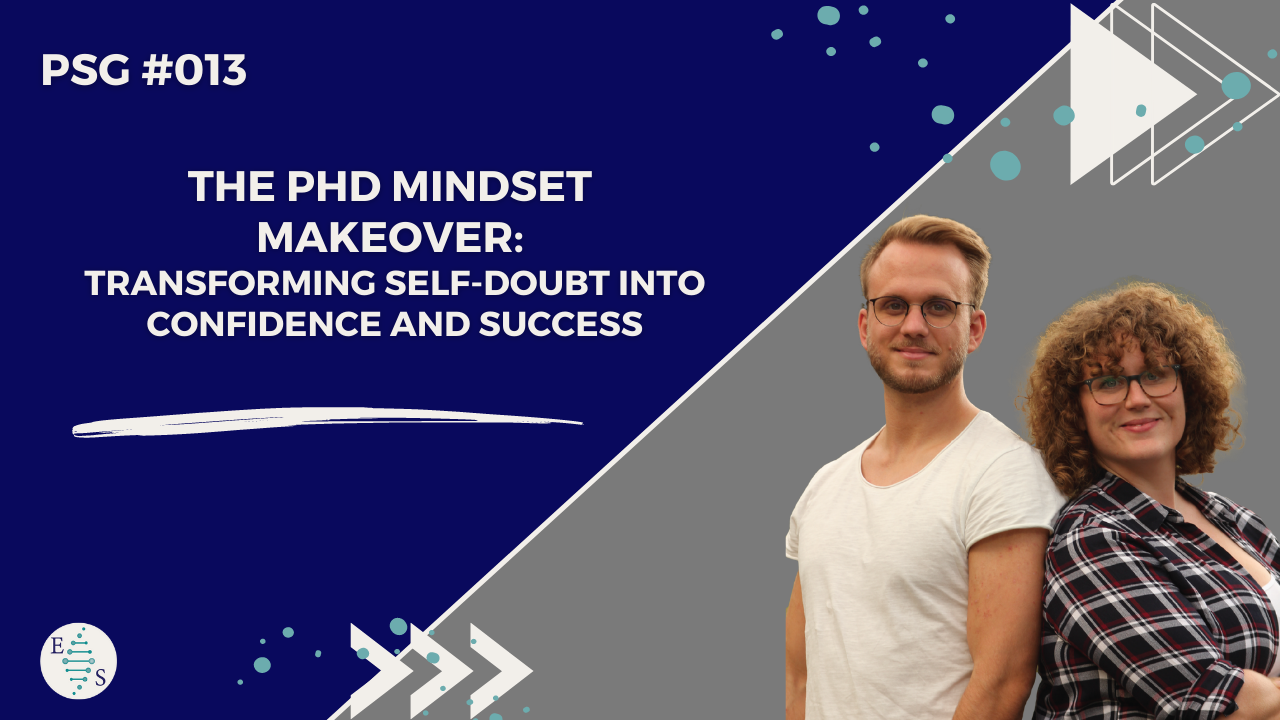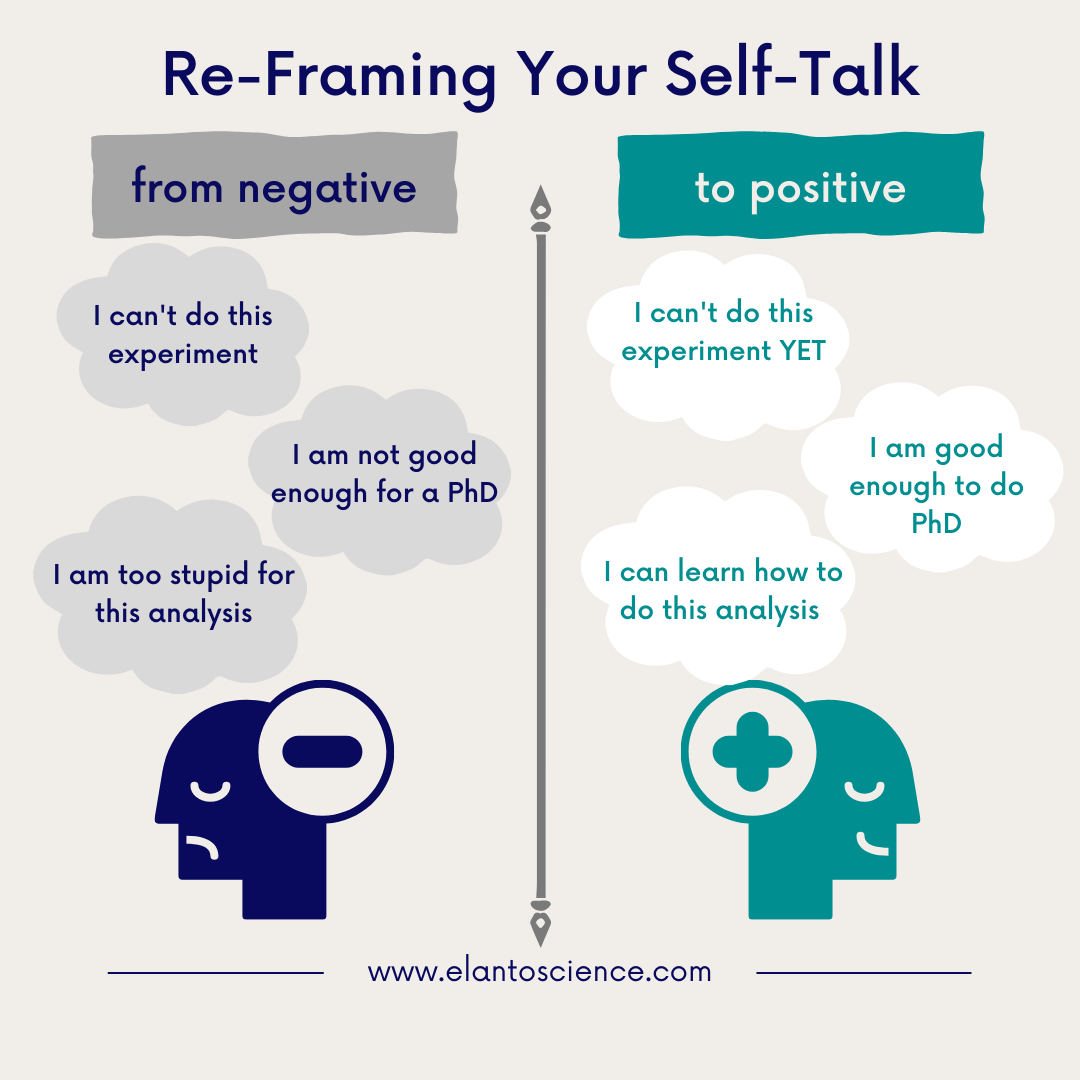
PSG #013: The PhD Mindset Makeover: Transforming Self-Doubt into Confidence and Success
Jul 23, 2023Reading time 4 min.
Introducing the PhD Mindset Makeover
Are you tired of feeling stuck in your PhD journey? Do you struggle with self-doubt and imposter syndrome? Afraid of new challenges? Disheartened by mistakes and failures?
I feel you, I have been there!
It's time for a Mindset Makeover! This transforms your mindset from one of self-doubt to one of confidence and success. You'll learn strategies to overcome imposter syndrome, deal with failure, and develop a growth mindset.
It is not just about getting through your PhD, it's about thriving in your academic career and beyond. It's time to take control of your mindset and transform your PhD journey.
Understanding Self-Doubt and Its Impact on Your Life and Career
Do you ever experience self-doubt? It can be an uncomfortable emotion, leaving us feeling vulnerable and uncertain.
I used to be very self-critical and doubted everything I did in my PhD.
- Did not dare to ask questions because I was afraid to look stupid.
- Did not like to give presentations because I thought I did not know enough and was not good enough.
- Did not dare to speak up even when I was quite sure I knew something valuable. This cost me many opportunities to learn, grow and connect!
Self-doubt can hold us back from achieving our potential and can impact our confidence and relationships. You might miss out on great opportunities because you are afraid and suffering from imposter syndrome.
Taking back your own power and having faith in yourself is a powerful tool for achieving success in life and career.
Strategies for Overcoming Self-Doubt
Self-doubt is a common feeling that affects many PhD candidates (and everyone around you!). However, it is important to understand that self-doubt can be overcome with the right strategies.
Let’s break them down:
1. Re-Framing Your Self-Talk for Maximum Results
Re-framing your self-talk can have a significant impact on your overall mindset and, ultimately, your success. Instead of allowing negative thoughts to consume your mind, try shifting your perspective to focus on positive self-talk.
- Start by identifying any negative self-talk patterns you may have and replace them with positive affirmations. For example, instead of saying "I'm not smart enough to get this done," try saying "I am capable and intelligent, and I will figure this out."
- If this feels too weird and you struggle using such positive affirmations, start smaller: „ I don’t know how to get it done YET“. The magic word here is YET. It opens up the possibility of being capable and learning anything you need to.
- It will take time and practice to rewire your thinking, but the results are worth it. For me, it took months or even years to really change my very strong negative thoughts. but it really improved step by step! Just being aware of them is already a great start.
- By then reframing your self-talk, you can boost your confidence, reduce self-doubt, and ultimately achieve your goals.
Remember, your thoughts have the power to shape your reality, so make sure you are feeding your mind with positivity and encouragement.
You also can read e.g. the book „The Power of Positive Thinking“. (don’t worry, you do not need to be religious)
With a commitment to positive self-talk, you can transform your self-doubt into confidence and success.

2. Developing an Action Plan to Achieve Confidence and Success
Developing an action plan to achieve confidence and success is an essential step towards transforming self-doubt into a winning mindset.
- The first step is to identify your goals and break them down into smaller, achievable steps.
- Next, develop a timeline and schedule for each step, prioritizing those that will have the greatest impact on your overall success. It's also important to anticipate potential obstacles and develop strategies to overcome them.
- Add Buffers to every task, 50% on top is a good rule of thumb.
- But don’t suffer in perfectionism, get the shitty first draft done and then, when your content is right you can make it pretty!
- Finally, celebrate your progress and accomplishments along the way, no matter how small they may seem.
Remember, building confidence and achieving success is a journey, not a destination.
By developing an action plan and sticking to it, you can transform self-doubt into a winning mindset and achieve your goals with confidence and success.
3. Nurturing a Supportive Network of Peers, Colleagues, and Mentors
One of the key elements of the mindset makeover is to nurture a supportive network of peers, colleagues, and mentors.
Pursuing a PhD can be a daunting task, and having a group of people who understand the challenges and can offer advice and encouragement can make all the difference.
- Peers can provide a sense of camaraderie and understanding, while colleagues can offer professional guidance and support.
- Mentors, on the other hand, can provide both emotional and intellectual support, sharing their knowledge and expertise to help you navigate the academic landscape.
Building and maintaining these relationships takes time and effort, but the benefits are immeasurable.
Not only can a supportive network help you to overcome self-doubt and build confidence, but it can also open doors to new opportunities and help you to achieve your academic and career goals.
So, take the time to cultivate these relationships, and don't be afraid to reach out for help when you need it.
Remember, you are not alone on this journey! Feel free to contact us too!
4. Practising Self-Care and Mindfulness to Support a Positive Mindset
Practising self-care and mindfulness is an essential part of transforming self-doubt into confidence and success. It's easy to get caught up in the demands of academia and forget to take care of ourselves.
However, prioritizing self-care can help us maintain a positive mindset and improve our overall well-being.
- Mindfulness practices, such as:
- meditation or
- deep breathing
- can help us manage stress and anxiety, allowing us to approach challenges with a clear and focused mind.
- Additionally, incorporating self-care activities, such as:
- exercise,
- spending time in nature,
- or indulging in a favourite hobby,
- can boost our mood and increase our sense of self-worth.
By making self-care and mindfulness a priority, we can cultivate a positive mindset and build the confidence we need to succeed in our academic and personal lives.
Remember, taking care of ourselves is not selfish; it's necessary for achieving our goals and living a fulfilling life.
5. Reflection & Evaluation: What Have You Achieved?
As you embark on your PhD journey, it's important to take a step back and reflect on what you have achieved so far.
We are often too close to a situation and can't see past anything.
- This moment of reflection and evaluation allows you to acknowledge the progress you have made and identify areas where you can improve.
- Keeping your past success in mind also helps to reduce negative self-talk and handle imposter syndrome. Make a list and collect everything you achieve so far, and also ask friends or family.
- Celebrate the small wins and milestones along the way, no matter how insignificant they may seem.
- Consider keeping a success journal. I write down 3 things I successfully did during the day every evening. They can be small: for example, I manage to write that email or I managed to make time for sport. This simple exercise improves your self-esteem over time!
Remember, success is not just about the end goal, but also about the journey and the growth you experience along the way. Embrace the challenges and setbacks as opportunities for growth and learning.
Keep pushing forward, and remember that you are capable of achieving great things.
Conclusion:
In conclusion, the Mindset Makeover can be a life-changing experience for any PhD student who is struggling with self-doubt and confidence issues.
By transforming negative thoughts into positive ones, you can gain the confidence you need to succeed in your academic (and professional) pursuits.
The key is to develop a growth mindset, which is the belief that one's abilities can be developed through hard work and dedication. This mindset allows you to focus on your strengths and weaknesses, and to use failures as learning opportunities rather than setbacks.
Additionally, seeking out support from mentors, peers, and mental health professionals can also be instrumental in building confidence and overcoming self-doubt.
Ultimately, the PhD journey is a challenging one, but with the right mindset and support, students can achieve their goals and succeed in their academic and professional careers.
So, embrace the Mindset Makeover and transform your self-doubt into confidence and success!
This week’s action step:
Awareness! Collect all your negative and limiting thoughts for the whole week → rephrase them to more positive ones e.g. using YET and place the list somewhere you see it every day.
If you want, let us know about your negative and limiting thoughts!
See you next week!
PhD survival guide is a free newsletter. Please support by sharing with those who may benefit from this post.
If you want more help:
We're excited to share the PhD Survival System with you because we know how tough it can be to get through a PhD program. We have developed a holistic system combining all the necessary areas to obtain optimal results.
We start with the foundation, your mindset, and on top of that we build two pillars: time management and stress management
More about the PhD Survival System here:
Stay connected!
Join our newsletter to receive the latest posts!
Don't worry, your information will not be shared.
We hate SPAM. We will never sell your information, for any reason.